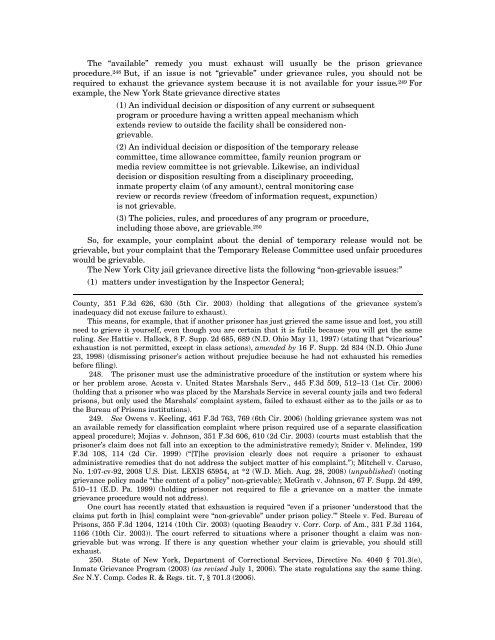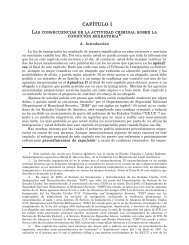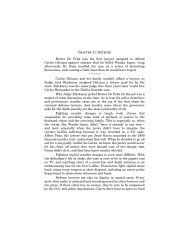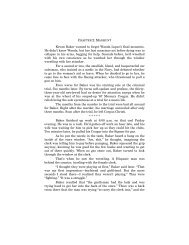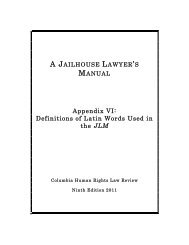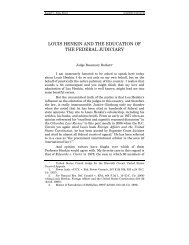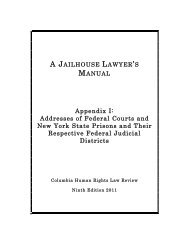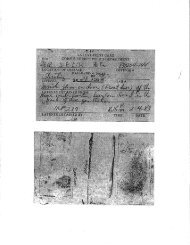A Jailhouse Lawyer's Manual Chapter 14 - Columbia Law School
A Jailhouse Lawyer's Manual Chapter 14 - Columbia Law School
A Jailhouse Lawyer's Manual Chapter 14 - Columbia Law School
Create successful ePaper yourself
Turn your PDF publications into a flip-book with our unique Google optimized e-Paper software.
The “available” remedy you must exhaust will usually be the prison grievance<br />
procedure. 248 But, if an issue is not “grievable” under grievance rules, you should not be<br />
required to exhaust the grievance system because it is not available for your issue. 249 For<br />
example, the New York State grievance directive states<br />
(1) An individual decision or disposition of any current or subsequent<br />
program or procedure having a written appeal mechanism which<br />
extends review to outside the facility shall be considered nongrievable.<br />
(2) An individual decision or disposition of the temporary release<br />
committee, time allowance committee, family reunion program or<br />
media review committee is not grievable. Likewise, an individual<br />
decision or disposition resulting from a disciplinary proceeding,<br />
inmate property claim (of any amount), central monitoring case<br />
review or records review (freedom of information request, expunction)<br />
is not grievable.<br />
(3) The policies, rules, and procedures of any program or procedure,<br />
including those above, are grievable. 250<br />
So, for example, your complaint about the denial of temporary release would not be<br />
grievable, but your complaint that the Temporary Release Committee used unfair procedures<br />
would be grievable.<br />
The New York City jail grievance directive lists the following “non-grievable issues:”<br />
(1) matters under investigation by the Inspector General;<br />
County, 351 F.3d 626, 630 (5th Cir. 2003) (holding that allegations of the grievance system’s<br />
inadequacy did not excuse failure to exhaust).<br />
This means, for example, that if another prisoner has just grieved the same issue and lost, you still<br />
need to grieve it yourself, even though you are certain that it is futile because you will get the same<br />
ruling. See Hattie v. Hallock, 8 F. Supp. 2d 685, 689 (N.D. Ohio May 11, 1997) (stating that “vicarious”<br />
exhaustion is not permitted, except in class actions), amended by 16 F. Supp. 2d 834 (N.D. Ohio June<br />
23, 1998) (dismissing prisoner’s action without prejudice because he had not exhausted his remedies<br />
before filing).<br />
248. The prisoner must use the administrative procedure of the institution or system where his<br />
or her problem arose. Acosta v. United States Marshals Serv., 445 F.3d 509, 512–13 (1st Cir. 2006)<br />
(holding that a prisoner who was placed by the Marshals Service in several county jails and two federal<br />
prisons, but only used the Marshals’ complaint system, failed to exhaust either as to the jails or as to<br />
the Bureau of Prisons institutions).<br />
249. See Owens v. Keeling, 461 F.3d 763, 769 (6th Cir. 2006) (holding grievance system was not<br />
an available remedy for classification complaint where prison required use of a separate classification<br />
appeal procedure); Mojias v. Johnson, 351 F.3d 606, 610 (2d Cir. 2003) (courts must establish that the<br />
prisoner’s claim does not fall into an exception to the administrative remedy); Snider v. Melindez, 199<br />
F.3d 108, 1<strong>14</strong> (2d Cir. 1999) (“[T]he provision clearly does not require a prisoner to exhaust<br />
administrative remedies that do not address the subject matter of his complaint.”); Mitchell v. Caruso,<br />
No. 1:07-cv-92, 2008 U.S. Dist. LEXIS 65954, at *2 (W.D. Mich. Aug. 28, 2008) (unpublished) (noting<br />
grievance policy made “the content of a policy” non-grievable); McGrath v. Johnson, 67 F. Supp. 2d 499,<br />
510–11 (E.D. Pa. 1999) (holding prisoner not required to file a grievance on a matter the inmate<br />
grievance procedure would not address).<br />
One court has recently stated that exhaustion is required “even if a prisoner ‘understood that the<br />
claims put forth in [his] complaint were “non-grievable” under prison policy.’” Steele v. Fed. Bureau of<br />
Prisons, 355 F.3d 1204, 12<strong>14</strong> (10th Cir. 2003) (quoting Beaudry v. Corr. Corp. of Am., 331 F.3d 1164,<br />
1166 (10th Cir. 2003)). The court referred to situations where a prisoner thought a claim was nongrievable<br />
but was wrong. If there is any question whether your claim is grievable, you should still<br />
exhaust.<br />
250. State of New York, Department of Correctional Services, Directive No. 4040 § 701.3(e),<br />
Inmate Grievance Program (2003) (as revised July 1, 2006). The state regulations say the same thing.<br />
See N.Y. Comp. Codes R. & Regs. tit. 7, § 701.3 (2006).


